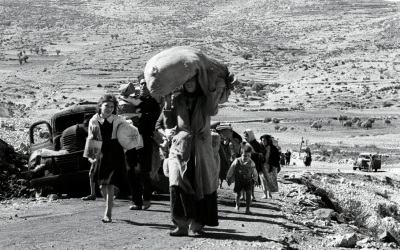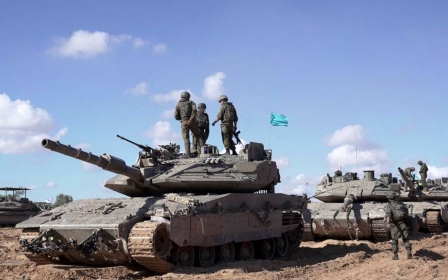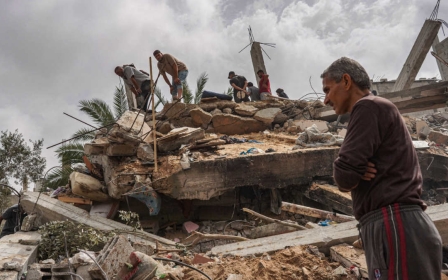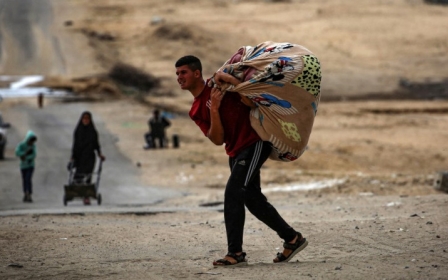War on Gaza: Palestinian fighters battle Israeli army in Gaza refugee camp on Nakba day
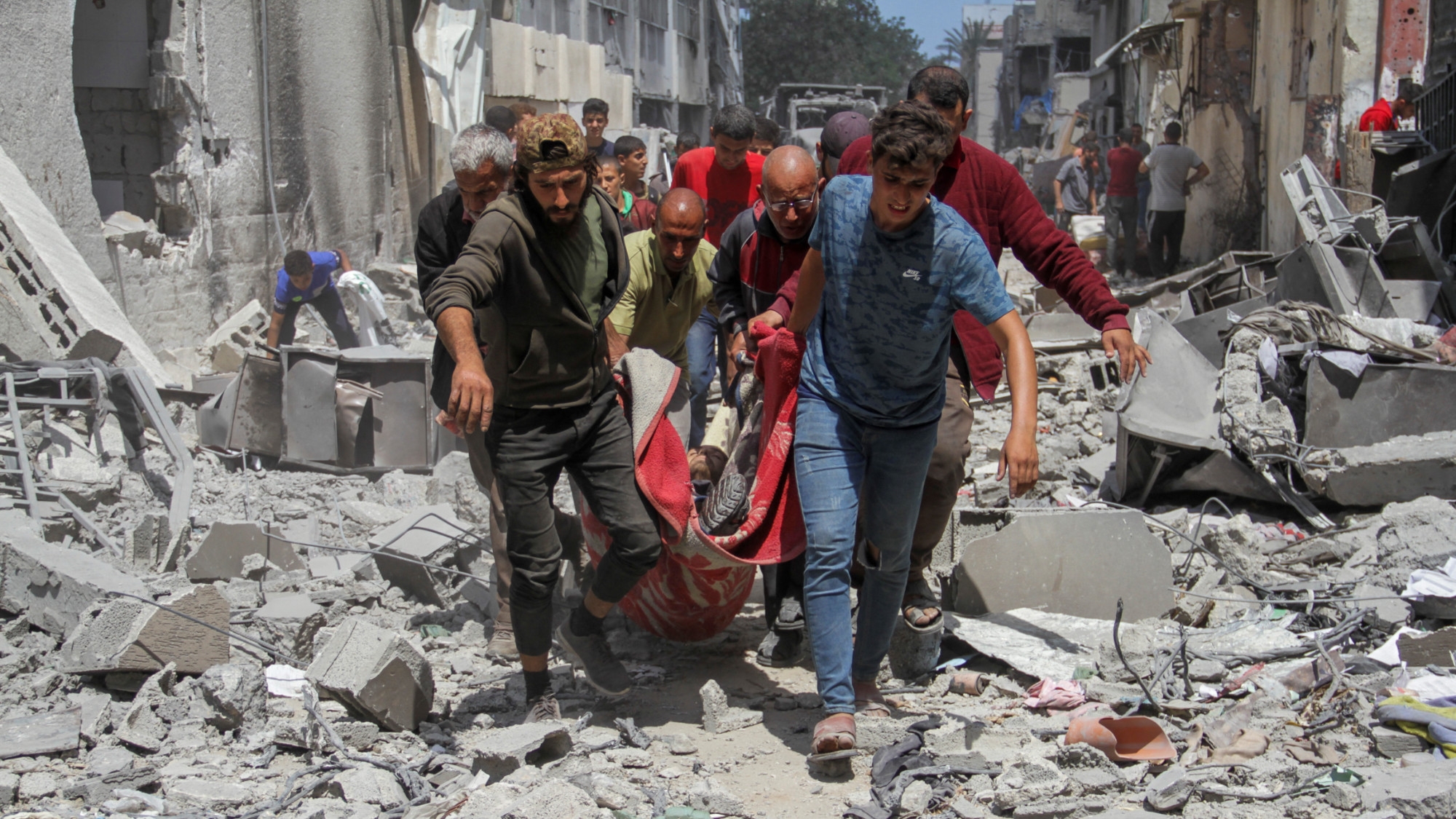
The Israeli military has continued to escalate its military operations across the Gaza Strip with fierce battles taking place in a Palestinian refugee camp on Nakba day.
Air strikes on Wednesday morning hit a UN clinic in Gaza City and homes across northern and central districts, killing at least 20 people, including children, according to the Palestinian news agency Wafa.
Heavy artillery shelling in Rafah caused widespread destruction to residential homes and property, the agency added.
The Palestinian health ministry said that 60 Palestinians have been killed over the past 24 hours, raising the death toll since 7 October to 35,233.
Last week, the Israeli military sent tanks and troops into Rafah, Jabalia refugee camp and the Zeitoun neighbourhood in Gaza City.
New MEE newsletter: Jerusalem Dispatch
Sign up to get the latest insights and analysis on Israel-Palestine, alongside Turkey Unpacked and other MEE newsletters
The advances came under the cover of intense aerial bombardment and were met with fierce Palestinian resistance on the ground.
The most intense battles were reported in Jabalia refugee camp in northern Gaza, where the Israeli military previously claimed Hamas' capabilities had been dismantled.
Jabalia is the largest of eight refugee camps in the besieged Gaza Strip, housing over 116,000 people officially registered with Unrwa, the UN agency for Palestinian refugees. The actual number of people in the camp is likely to be much higher.
Palestinian refugee camps like Jabalia's were established in 1948 following the ethnic cleansing of Palestine by Zionist militias to make way for the creation of the state of Israel, in an event known to Palestinians as Nakba - or "catastrophe" in English.
Palestinians marked the 76th anniversary of the Nakba on 15 May.
Marches took place across the occupied West Bank and within Israel by Palestinian citizens, reaffirming their right to return to the villages and cities they were expelled from.
More than 750,000 Palestinians were forcibly removed from their homes during the Nakba.
Along with their descendants, they number at least 5.8 million refugees today, living in occupied Palestinian territories and neighbouring Arab countries, as well as countries around the world.
Israel has never allowed Palestinian refugees to return to their homeland, making their plight the longest unresolved refugee crisis in modern history.
Intense battles
The battles in Jabalia have been among the most intense during Israel's seven-month war on the Gaza Strip.
Camp residents told Reuters that Israeli tanks destroyed clusters of homes but were facing heavy resistance.
"They are bombing houses on top of their inhabitants. We know of many families being trapped inside their homes," said Abu Jehad, a camp resident.
Hamas said it killed 12 soldiers on Wednesday and hit dozens of armoured vehicles in the ongoing battles since last week.
The group released videos on Tuesday showing fighters engaged in close-quarters combat in Jabalia and Rafah.
The footage showed fighters coming out of tunnels to plant explosives underneath tanks and hitting other armoured vehicles with shoulder-fired missiles.
Middle East Eye could not independently verify when and where the footage was filmed but since the start of the war Hamas has regularly documented its attacks on Israeli soldiers on video.
The Israeli military said five soldiers have been killed since Friday and more than 100 have been wounded, some seriously.
On Tuesday, the military said the operation in Zeitoun had been concluded while the assault in Jabalia was "intensifying".
It added that troops were engaged in "intense" battles there and that they "eliminated dozens" of fighters in battles across the Gaza Strip.
Jabalia and Zeitoun are both located in northern Gaza, an area which Israel heavily attacked between November and December before declaring it cleared of Hamas battalions in January.
Intense fighting in recent days, which included rocket fire at Israel, suggests the Hamas military in the north is far from depleted.
The group has been attacking "more aggressively", an Israeli reservist currently fighting in Jabalia told the Wall Street Journal.
Palestinians were firing more anti-tank missiles at troops sheltering in Palestinian houses and inside military vehicles daily, the unnamed reservist added.
A company commander also in Jabalia told Haaretz it was "frustrating" to see renewed fighting in northern Gaza and the launching of rockets from there seven-and-a-half months after the war began.
The commander added that Hamas was learning and changing tactics by focusing more on setting explosive devices in buildings.
Aid blockade
Meanwhile, aid workers continued to urge Israel to reopen the Rafah crossing with Egypt, which it seized last week.
The continued closure has raised alarm among aid workers over the potential catastrophic consequences for Gaza's 2.5 million population, who face imminent famine.
Since 6 May, just six trucks of food have entered Gaza through the Karem Abu Salem (Kerem Shalom) crossing with Israel, Juliette Touma, Unrwa spokesperson told MEE on Tuesday.
Josep Borrell, the European Union's chief diplomat, urged Israel to immediately end its operation in Rafah, which he said disrupted the distribution of humanitarian aid and led to more internal displacement.
"The EU is calling on Israel to refrain from further exacerbating the already dire humanitarian situation in Gaza and reopen the crossing point of Rafah," Borrell said in a statement posted on social media platform X.
"Should Israel continue its military operation in Rafah, it would inevitably put a heavy strain on the EU's relationship with Israel," he added.
US Secretary of State Antony Blinken said the operation has had a "negative impact" during a press conference in Kyiv.
Middle East Eye delivers independent and unrivalled coverage and analysis of the Middle East, North Africa and beyond. To learn more about republishing this content and the associated fees, please fill out this form. More about MEE can be found here.


